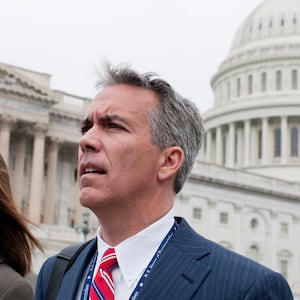Donald Trump is not a conservative.
He’s not a traditionalist, institutionalist, or incrementalist. He’s not a free-trader. He’s openly hostile to meritocracy, accountability, and the rule of law. He does not advocate for smaller government or smaller deficits. His views on free expression, privacy, and due process are frighteningly authoritarian.
George Will is a conservative and is so thoroughly unimpressed with Trump’s conservative credentials and presidency that he left Trump entirely out of The Conservative Sensibility, his new 600-page primer for post-Trump conservatism. Will confirmed the omission—unprompted—in the first minute of an interview with The Daily Beast.
Will is 78 years old, has a Pulitzer Prize, and has written more than a dozen books, but The Conservative Sensibility is not a valedictory memoir or a regurgitation of Washington Post columns. It’s a road map, a call to conservatives to put the Trump mess behind them and start fresh with new ideas and with Congress re-centered as the country’s seat of power.
As soon as I picked up the book, I started seeing you everywhere—Meet the Press, Morning Joe, your Washington Post column, social media.
I’m an oppressive presence. [Laughs.] I’m going back to baseball for the next book I write. I spend most of my time trying to avoid talking about Donald Trump. I wrote The Conservative Sensibility, in which his name does not appear, and every time I go on television the host says, “I see Trump is not mentioned in your book. Let’s talk about Trump.”
Let’s start there since you brought it up. [Laughs.] The book reads partly as a policy guide for a post-Trump Republican Party. Was that the idea?
I put “sensibility” in the title because a sensibility to me is more than an attitude but less than an agenda. I didn’t want to tell people what to think but how to think, and I didn’t want to write another Washington book or another book about the current president. The book is an exercise in intellectual archaeology in the American founding and the extraordinarily forthright and successful progressive rebellion against that.
One of the foundational elements of the book is the idea of natural rights. What do you mean when you write about natural rights?
Natural rights are rights that are conducive to the flourishing of creatures of our nature. Once you adopt that language—and our founders did—you necessarily adopt the idea that there is a fixed human nature. The natural-rights doctrine limits government in an effort to secure our natural rights that preexist government and not to give us those rights.
Once you accept that there is a human nature, you have to limit government in a way that prevents the enormous totalitarian temptation that so many governments succumbed to in the 20th century. If you reject the idea of a fixed human nature and define human beings as creatures who can define their culture, that leads to the temptation that you can use government to shape the culture and shape a new kind of person. That’s what ruined the 20th century.
What is that human nature? That we’re primates who club each other on the heads, steal each other’s women, and start wars?
We have charitable impulses. We have a moral sense. We have a sense of justice and injustice. We argue constantly, and argument is inherent in our Constitution. What is an unreasonable search and seizure? What is an establishment of religion? We litigate political philosophy in the Supreme Court. I start the book with two contrasting Supreme Court cases on saluting the flag, and that is how we do political philosophy.
The concept of natural rights is easier for me to understand as a legal fiction that imports certain ethics and standards—the Golden Rule, the Hippocratic Oath, etc.—that are manifestations more of what we ought to have than of human nature.
I agree with that. Those of us who believe in natural rights without a theological underpinning are essentially rule utilitarians. Societies flourish when they acknowledge, respect, and follow certain rules.
You quote John Dewey in the book writing that natural rights “exist only in the kingdom of mythological zoology.” What does he mean?
He was taking seriously the proposition that people like Hobbes and Locke who wrote about the state of human nature were taking it very seriously. It seems obvious to me that Locke thought of the state of human nature as a heuristic device to help us think about what people were like without government. Were they as barbarous as Hobbes saw, or were they naturally sociable as Locke saw?
Governments are instituted to cure—and Locke’s word here—the inconveniences of the state of human nature. Once you establish that there is a natural sociability in human nature, and I think there certainly is, government becomes an important but not all-important.
As you move forward from conservatism to the Progressive Era, the New Deal, the Great Society, etc., is that necessarily in tension with the idea of a government existing primarily to secure certain rights?
The founders would say that our rights are never all that secure because there are so many ways that government and society can go wrong. Woodrow Wilson thought that the separation of powers was fine when we had four million people living mostly on the Atlantic coast but that a more complex society needed a more complex government. Wilson put intellectual theory to Teddy Roosevelt’s theory that a president could do whatever he damn well pleased as long as it wasn’t explicitly forbidden by the Constitution or statute.
Progressives said that as society becomes more complex, there is more urgency for government to intervene and supervise it. The Hayek view is that this is exactly wrong and that the more complex a society becomes the more perilous it is for governments to intervene. As a society becomes more complicated, governments know less of what there is to know and markets—which are simply information-aggregating mechanisms—should be allowed to work.
The Supreme Court, though, has taken a fairly protective view of individual rights like speech, search and seizure, handguns, etc.
That’s exactly right and fairly recent. In the 19th century, the Supreme Court was not as focused on protecting individual rights. Since World War II, protecting individual rights has been a major arena for the Supreme Court.
Is that incompatible, though, with a government building highways or providing Medicare for all?
Not a bit. Madison’s idea in Federalist 45 that the powers granted to the federal government would be few and defined is no longer the case. The interstate highway system started as the National Defense Highway Act. I went through Princeton’s graduate school supported by a grant provided by the National Defense Education Act. In the Elementary and Secondary Education Act of the 1960s, the federal government moved into an area of state and local responsibility, and No Child Left Behind was a subsequent iteration of that.
The founding era looks more and more to me like the establishment of a government for the benefit of white landowners, and developments like the 14th Amendment and the Civil Rights Act of 1964 have done a lot of the “more perfect union” heavy lifting. That is a big part of the broadening of federal powers.
All of those cumulative inclusions were implicit in the founders’ vocabulary. The political genius of Martin Luther King was to say that he was not trying to revolutionize America, that he was trying to restore America to its commitments. He closely linked his movement to the founders’ rhetoric.
My conservative sensibility is not opposed to ameliorative government. It is perfectly fine for the American people to decide collectively in 1935 that they want Social Security, or to decide collectively in 1965 that they want Medicare. In 2025, maybe that will be single-payer health care. Those are all within the broad parameters of reasonable democratic choice.
That’s a lot different than current trade and immigration policies that are aimed mainly at driving racial resentment.
I was on a radio show with a big Trump supporter who talked about how great it is what Trump is doing about immigration and complaining about NAFTA. I responded that NAFTA has been so good for the Mexican economy that net migration to the United States has been negative for seven years now. You’d think immigration hawks would have connected those dots by now.
Do you see anything happening on the right that signals a policy shift in a post-Trump Republican Party?
Not yet. Frankly, one of the reasons I wanted to write this book was to provide a useful work for conservatives when they return from being a cult of personality to being a political party. After Margaret Thatcher became the leader of the conservative wing of Parliament, she pulled out a copy of Hayek’s The Constitution of Liberty, slammed it on the desk, and said “This is what we think.” I have a fantasy of a future conservative leader slamming The Conservative Sensibility on the desk and saying the same thing.
What makes Elizabeth Warren interesting and admirable is not that she’s right—I think she’s wrong about almost everything—but that she brings gravity to politics. I think it’s still an open question of whether Republicans will bring ideas back to politics after we decide that we can’t properly reduce political philosophy to, “Only I can fix it.”
Bill Clinton’s 1992 campaign was built around “It’s the economy, stupid. Change vs. more of the same. Don’t forget health care.” Should the Republicans have a 2024 mantra that fits on a postcard?
In 1964, when I cast my first vote in a presidential election for Barry Goldwater, 77 percent of the American people said they trusted the American government to do the right thing all of the time or most of the time. Today’s it’s 17 percent. I would urge people to ask why. We need to have a conversation about the proper scope and actual competence of government. Progressives have an enormous stake in this. Everything progressives want to do depends on strong government, and that depends on confidence in government.
Republicans don’t want good government. That runs counter to their central argument that the government is our main problem, and they strengthen that argument by running the government badly.
Republicans do nothing to actually shrink government, though. Providing entitlements, which is most of what government does today, has grown faster under Republican presidents than it has under Democratic presidents.
Would conservatives be better served by Trump losing in 2020 and having to find an actual policy agenda going forward?
Yes, yes, and yes. There’s no question about that.
What would that look like?
You would get arguments outside the political class from people like Yuval Levin and hopefully me. Within the political class, people would start paying attention to those arguments. Postwar conservatism was a bookish movement—Richard Weaver’s Ideas Have Consequences and Friedrich Hayek and Milton Friedman—that evolved into a network of intellectual think tanks like American Enterprise Institute, the Cato Institute, and the Heritage Foundation.
I think we’ll have that again. There will be younger writers and younger politicians, and we’ll have a genuine fight to see what comes next. There are signs of intelligent life in Congress, which knows it has delegated its job to presidents who will not always be progressives. But first, we have to clear the ground and remove this awful presence from our lives.







